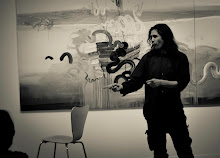One of the things that people routinely ask me about the stand up show is about memory. How, they ask, can you remember it all? What is the trick?
A sensible question, and yet one that makes me always feel like a conjuror, who has pulled a fast one. For I suspect if that I did remember the work as they think I must - word for word, I could not remember any of it. The game is to abstract the meaning of the text, and so to reduce it to a certain number of salient facts. What I am remembering is an abstract, which the performance then fleshes out.
And yet that is not quite the whole picture. For actually a single performance uses a number of different types of memory. Firstly there are the deep memories I have of these works. Most of them are based on pieces and thinkers I taught for a number of years, and studied very deeply for very many years before that. When you have read a book one thousand and one times, it tends to stick in the mind. Although there are issues of accuracy about such deep memories. I will therefore before a new performance, re-read the original text, and keep it around as I start on the piece. Secondly, when I am working on a piece for the first time, I often use the fact that I have a fairly developed visual aspect to my memory. I can remember quite well pages, and the arguments that are on the pages. As I perform I am actually following the pages in my thought, turning them over, and imagining the significant phrases.
Thirdly each piece I perform is worked up very much as I work up a story for telling. I do not write it down and draft it as a written text. On the contrary, I gradually work out what I am going to say aloud, repeating, composing, and rehearsing at the same time. It is at this point I decide about the voice and the passion, about who is saying what, and how much of the subsequent history or work of other thinkers I am going to blend into my interpretation of the piece, and how and when. All of which moves then feed back into my memory, creating 'chords' of thought and passion: Remember a phrase and passion comes to mind, remember a passion and one has an idea... I often will play with phrases again and again, fiddling with the emphasis, and the rhythm of the language - I like my performances to sound almost as if they were in blank verse - until I am happy with it (and have driven anyone standing near me quite quite mad).
Once the piece is half baked, I then perform it to my long suffering partner, and she gives me her take on it. She tells me how the mood, and the passions sounds to someone else. This is actually very important, as it never sounds the same in one's own mind, as it does to another. At which point I will discuss the important phrases with her, and work out those passages or sentences I have to get right. These I then commit to memory in the most conventional of senses.
After which, I rehearse a new piece every time I have a minute (when walking, driving etc). The point of these rehearsals is only partially to memorise. Each rehearsal is different, and explores other ways in which the piece might be said. They allow therefore for experiment, to see if I can find a better way to make the arguments in the piece. But also they allow me to explore the different avenues which different phrases lead to. Every performance is different, and to a degree the words I use are ad libbed. It is therefore highly useful to explore different ways you have said something, so that when you are in front of a live audience and use an odd phrase or a set of words that you had not used before, (which actually sometimes happens), you can still keep the piece going.
At which point, one is ready to go live. My first performance of most of my pieces is to an open mike audience, who I know very well. Their reaction will then allow me to accurately gauge the power or difficulty of the piece, and will to a large degree define its fate. Will it be a one off / occasional act or one of my absolute standards? We also video this performance, which is itself vital. For it is these videos I then turn to when reprising the piece. I learn it a second time in a totally different way, from the video, with all its mannerisms, gestures and audience reaction. So that when one is working up a piece for a second time, one is doing so very much in the light of how one performed it live, and what followed. This is actually vital, as it allows one to 'remember' one's timing, and to know exactly which pieces and parts worked and why.
The resulting piece is therefore a strange beast. Never purely oral or written, it oscillates between the two. It is a product of an initial written text, but also living memory (which always repeats in difference), and eventual video recording/live performance. It bounces around the written-spoken juncture, is part one and part the other. A place that really works for me and my mind but also I always feel, rather apt for performance philosophy.


No comments:
Post a Comment